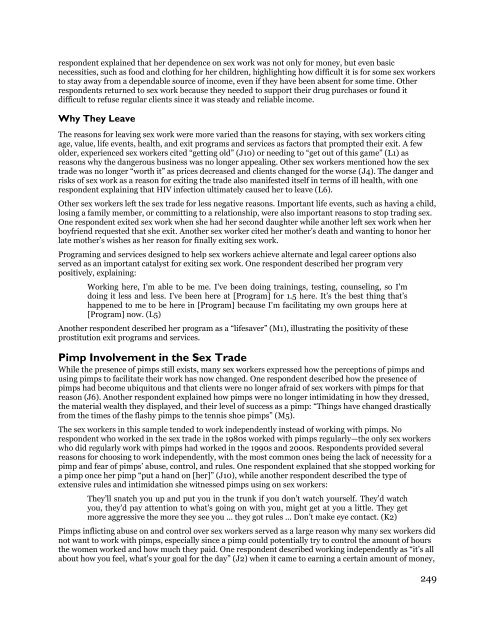413047-Underground-Commercial-Sex-Economy
413047-Underground-Commercial-Sex-Economy
413047-Underground-Commercial-Sex-Economy
You also want an ePaper? Increase the reach of your titles
YUMPU automatically turns print PDFs into web optimized ePapers that Google loves.
espondent explained that her dependence on sex work was not only for money, but even basic<br />
necessities, such as food and clothing for her children, highlighting how difficult it is for some sex workers<br />
to stay away from a dependable source of income, even if they have been absent for some time. Other<br />
respondents returned to sex work because they needed to support their drug purchases or found it<br />
difficult to refuse regular clients since it was steady and reliable income.<br />
Why They Leave<br />
The reasons for leaving sex work were more varied than the reasons for staying, with sex workers citing<br />
age, value, life events, health, and exit programs and services as factors that prompted their exit. A few<br />
older, experienced sex workers cited “getting old” (J10) or needing to “get out of this game” (L1) as<br />
reasons why the dangerous business was no longer appealing. Other sex workers mentioned how the sex<br />
trade was no longer “worth it” as prices decreased and clients changed for the worse (J4). The danger and<br />
risks of sex work as a reason for exiting the trade also manifested itself in terms of ill health, with one<br />
respondent explaining that HIV infection ultimately caused her to leave (L6).<br />
Other sex workers left the sex trade for less negative reasons. Important life events, such as having a child,<br />
losing a family member, or committing to a relationship, were also important reasons to stop trading sex.<br />
One respondent exited sex work when she had her second daughter while another left sex work when her<br />
boyfriend requested that she exit. Another sex worker cited her mother’s death and wanting to honor her<br />
late mother’s wishes as her reason for finally exiting sex work.<br />
Programing and services designed to help sex workers achieve alternate and legal career options also<br />
served as an important catalyst for exiting sex work. One respondent described her program very<br />
positively, explaining:<br />
Working here, I’m able to be me. I've been doing trainings, testing, counseling, so I'm<br />
doing it less and less. I've been here at [Program] for 1.5 here. It’s the best thing that’s<br />
happened to me to be here in [Program] because I'm facilitating my own groups here at<br />
[Program] now. (L5)<br />
Another respondent described her program as a “lifesaver” (M1), illustrating the positivity of these<br />
prostitution exit programs and services.<br />
Pimp Involvement in the <strong>Sex</strong> Trade<br />
While the presence of pimps still exists, many sex workers expressed how the perceptions of pimps and<br />
using pimps to facilitate their work has now changed. One respondent described how the presence of<br />
pimps had become ubiquitous and that clients were no longer afraid of sex workers with pimps for that<br />
reason (J6). Another respondent explained how pimps were no longer intimidating in how they dressed,<br />
the material wealth they displayed, and their level of success as a pimp: “Things have changed drastically<br />
from the times of the flashy pimps to the tennis shoe pimps” (M5).<br />
The sex workers in this sample tended to work independently instead of working with pimps. No<br />
respondent who worked in the sex trade in the 1980s worked with pimps regularly—the only sex workers<br />
who did regularly work with pimps had worked in the 1990s and 2000s. Respondents provided several<br />
reasons for choosing to work independently, with the most common ones being the lack of necessity for a<br />
pimp and fear of pimps’ abuse, control, and rules. One respondent explained that she stopped working for<br />
a pimp once her pimp “put a hand on [her]” (J10), while another respondent described the type of<br />
extensive rules and intimidation she witnessed pimps using on sex workers:<br />
They’ll snatch you up and put you in the trunk if you don’t watch yourself. They’d watch<br />
you, they’d pay attention to what's going on with you, might get at you a little. They get<br />
more aggressive the more they see you … they got rules … Don’t make eye contact. (K2)<br />
Pimps inflicting abuse on and control over sex workers served as a large reason why many sex workers did<br />
not want to work with pimps, especially since a pimp could potentially try to control the amount of hours<br />
the women worked and how much they paid. One respondent described working independently as “it’s all<br />
about how you feel, what's your goal for the day” (J2) when it came to earning a certain amount of money,<br />
249


